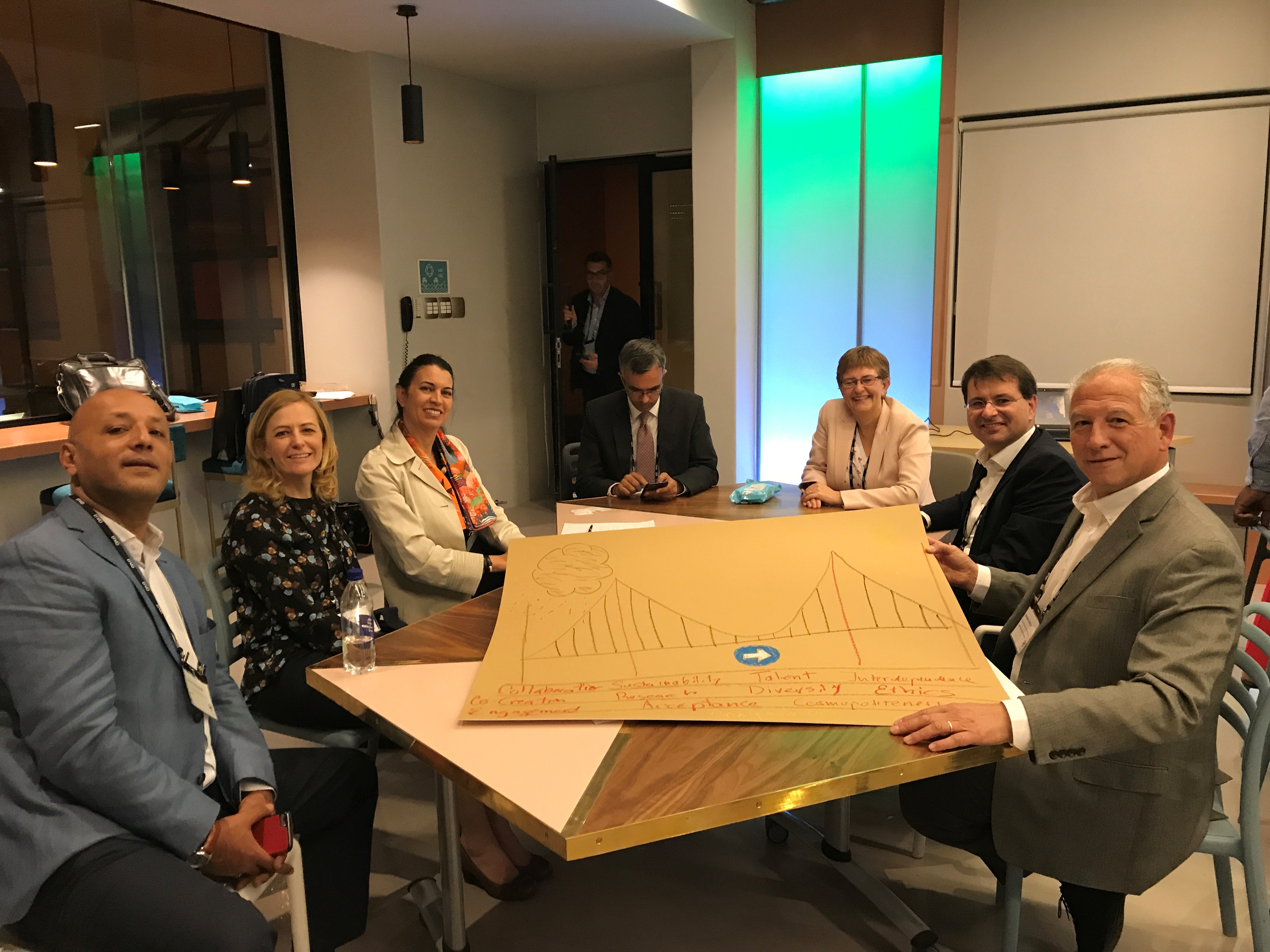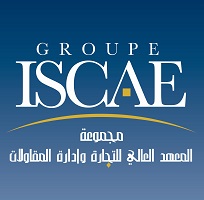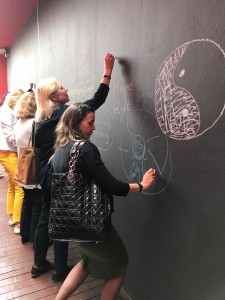
Le Groupe ISCAE a été représenté à l’EFMD MEA Conference organisée à Johannesburg, South Africa du 8 au 10 novembre 2017 sous le thème « Developing Opportunities and Talent for Growth ».
Les participants ont été invités à exprimer, en images et en couleurs leurs idées sous forme de “brainstorms”.
En effet, des ateliers en groupes de 6 à 7 nationalités différentes ont permis d’exprimer les challenges spécifiques et les dénominateurs communs en termes de 3C (Country, Culture, Context) ainsi que le rôle des Business Schools en tant qu’acteurs du changement.
Cette conférence a été l’occasion de renforcer les liens de coopération existants et d’en nouer de nouveaux, de prendre conscience de la présence de plus en plus significative des écoles marocaines (ou établies au Maroc), de leur comportement au sein de la communauté internationale et africaine en particulier, et de la nécessité de capitaliser dessus pour que notre pays soit représenté au mieux. Ainsi, la présence d’écoles publiques et privées était à l’image de la diversité et de la complémentarité du secteur de l’enseignement supérieur du management au Maroc.
Ci-après, une synthèse des présentations et ateliers autour du thème central ”Developing Opportunities and Talent for Growth”, telle que rapportée par Madame Nada BIAZ :
« The conference was hosted by Gordon Institute of Business Science, which happens to be one of our partners in South Africa GIBS.
GIBS Mission Statement: “At GIBS we significantly improve responsible individual and organizational performance, primarily in South Africa and increasingly in our broader African environment, through high quality business and management education”.
In a region where there are so many challenges, a South African humanitarian actor opened the conference, under the theme of:
“Overcoming Against All Odds: Lessons from Gift to the Givers”.
This session was presented by Imtiaz Sooliman, the founder of a humanitarian organization called “Gift to the Givers”, that helps people regardless of their color, origin, religion, because some communities suffer from situations they didn’t contribute to (wars, instability, natural disasters…). This agency rises founds and organizes logistics and expertise for operations such as mobile hospitals and providing back-up supplies. This African NGO was involved in Sri Lanka after a Tsunami, in Niger suffering from Famine, Pakistan after Earthquake, in Bosnia, in Somalia, …
The message that was meant to be conveyed was about how civil society and the corporate actors can contribute to help thrive in a challenging environment, especially in African countries.
Actually, there are very different challenges from one MEA sub-region or country to another; but also, there are common ones. Here are some specificities of the MEA region:
-60% of the population is under the age of 25
-3 million young people enter the job market every year
-29 % of employment is in public sector, which puts a lot of pressure on governments
This is a challenge in the sens that it becomes a big mess when expectations of youth are not met.
Therefore, Youth Empowerment is at the heart of both opportunities and talent growth. However, 65 % of today students will be working in jobs that do not exist yet. Educating a responsible, autonomous and agile new generation is a key factor of success.
Moreover, the decision of going for business by investors or multinationals depends a lot on geopolitical and geo economical contexts. That is why it is important to educate business leaders and decision makers who can decode real versus false opportunities, assess risks, and understand local specificities.
All that being said, what is the MEA potential?
-Population growth
-Economic growth (Business opportunities, Increasing middle class, extensive market)
-Social development (through Education, women empowerment, healthcare)
New opportunities to develop should be business amongst sub-saharian Africa and sub-saharian countries and Arab and Middle East countries, on top of the traditional relations with Europe and Asia.
The opportunities are in building things together. The B.Schools have a lot to do in this regard, developing African business, leadership and education models and sharing them with the rest of the world.
In this regard, B.Schools should be Change Agents by grooming a new generation of leaders and going from Quality to Impact, a generation capable of decoding the signs of their global environment and calculating its impact on economic growth, a generation able to make structured decisions in an uncertain and complex economic climate. That would be an agile anticipating generation with quick, smart and creative reactions, but also with a long-term vision. Everybody agrees now that what matters most in B.Schools, is not what students study, it’s how they solve problems. So real world exposure, through corporate partnership is at the heart of the process of education in a Business School, whether it’s through case studies, immersion field projects, guest speakers, or professional oriented events.
On another note, in a virtually small world, mobility gets a critical piece of interest, with different sets of tools: student exchange, distant on-line learning, Uber, personalized services… B.Schools Students should be prepared and eager to move as much as possible, physically and virtually. Connectivity should not be a problem anymore. African and MEA countries in general still have a way to go in this regard. Currently with very limited flight connections within the region, it is easier to get to western countries than go to a neighbor country from the same sub-region.
From the point of view of one of the guest speakers, Howard Thomas, distinguished Emeritus professor and writer of a book on “Findings on the future of management education in Africa”, there are critical Issues deserving greater attention in Management Education in Africa:
-Continual empirical deficit in understanding the variety and evolution of business globally
-Current challenges in African Management Education
.Capacity building and upskilling of workers
.The need for a management education Ecosystem (sharing materials, case studies, collaboration, reasonable standards for local and regional accreditations such as AABS…)
-Specific critical issues: Blind spots
.Lack of demand-side orientation (business schools are largely shaped by their university context rather than the market, too much regulation of management education by African governments, lack of research on management practices / needs from students, stakeholders and businesses that can inform the design of management education in Africa.
.Unequal access to management education (issue of affordability, insufficient capacity, few scholarships, business have yet to take an active partnership role in management education)
.The need for a global – local balance (important global perspectives, need of balance through “glocalisation”, between local relevance of African management education, culture and context, with importance of global awareness and relevance, too much mimicry of western approaches to management education). Some schools focus on global rankings rather than African relevance and values. There is a need for greater focus on issues and problems in Africa by upscaling research and bridging the gap between faculty and corporate world.
.Data Analyses (availability, credibility, consistency, relevance, reliability,…).
No matter what the specific challenges and opportunities are in the MEA region, there are also some general global disruptive factors to deal with. The most challenging one is today’s disrupting society, that determines the way talents should be developed.
What is disrupting Society?
A society that goes faster than our ability to adapt as organizations, because it is changing faster than ever before and it will never go slower again. This fact makes it so uncertain and hard to imagine what the future is going to be.
The pace of the change is exponential, global and it challenges all generations. It is a lifelong adaptation path. In this context, the singularity means positioning the human intelligence versus artificial intelligence. What is it that a person can do that the machine cannot do? How can a human contribute without feeling idiot or redundant? This is where an individual can express his singularity; whether it is a student, a faculty, a manager, or a worker…What does this mean for business education? Where is the benefit? Where is the transformative mission?
Empathy (putting yourself in the others’ shoes) is a key success factor to understand what others need really, and what you can bring that machines cannot bring.
Consequently, Singularity and Empathy are two important words in a disrupting society. We are still human and we should think in terms of H2H (Human to Human) relations not B2B or B2C.
The personalization approach means that connection is not about technology only, it is also about esteem, reputation and confidence, about safety, order and certainty, about community belonging and love. So what is needed is “more knowledge colored with empathy”.
Another requirement to survive and succeed in disrupting society, is to learn, learn to learn, learn to unlearn and learn to relearn, through the glasses of human connection, singularity and empathy.
The process of Unlearning/ Relearning is about changing your internal dialogue; it is not about acting, it is about being and acting according to new messages.
Leadership is about what people feel and this is only possible if you develop an H2H attitude.
Get rid of your assumptions, unlearn, and relearn …
Be human and connect as a human, this is the best consistent possible response to a disrupting society, and that’s part of the Business School mission as Catalyst of change.
Another Issue / odd to overcome: Scare resources and urgent need for innovation.
Few resources can have advantages.
What do resources mean for innovation?
-Tangible (places, equipment, ICT, infrastructure, tools)
-Skills (management, collaboration, imagination, creative problem solving)
-Mindset and character.
No matter what the tangible and skills are, conditions for success in this context are related to mindset:
Beta mode skills
Experimental attitude
Awareness/ consciousness
Co-creation approach
Seeking many partners
Obtaining commitment and stitch together the key people
Being innovation catalyst.
Like in any region, Business Schools from MEA are themselves disrupting and disrupted. They are disrupting when they are pioneers in their field, and they are disrupted by new players such as international campus branches opening, online learning and moocs, and corporate physical or virtual campuses.
To overcome all these challenges, develop opportunities and talents, there is definitely a need to raise dynamic capabilities within business schools, to encourage agility and inclusiveness.
The conferences ended with a call for Action for Middle East and Africa, in order to contribute as co-responsible actors of change.”





